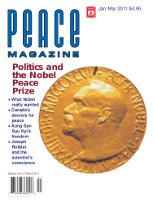
Peace Magazine Jan-Mar 2011, page 19. Some rights reserved.
Search for other articles by John Bacher here
BY JOHN BACHER
In his last annual message to Congress in 1908, US President Theodore Roosevelt chose to give a dramatic message of the evils of climate change and watershed loss arising from the destruction of forests. In his remarks, Roosevelt cited a failed state of his own day, Imperial China, which was suffering from deforestation bringing droughts, soil erosion, and destructive flooding, as a message for Americans to wake up to the reality of spreading deserts, flooding, and erosion in their own country. (James R. Lewis, “Theodore Roosevelt, a Cautionary Tale,” Forest/History Today, Spring/Fall 2005.)
While in 1908 Roosevelt encountered great resistence to his call for the protection of forests, over time his message won out throughout North America. The long presidential term of his cousin, Franklin Roosevelt, saw millions of acres of land acquired from private interests reforested through the work of the armies of young men serving in his Civilian Conservation Corps (CCC). Many slavery-era cotton plantations were acquired for new forests, like the vengeful cry of the Battle Hymn of the Republic.
In Canada, vast tracts such as the Oak Ridges Moraine—the headwaters of many streams such as the Don and the Humber Rivers flowing through Toronto—were reforested from dust bowl-like conditions, through the determination of the visionary chief forester of Ontario, Edmund J. Zavitz. The Ontario Greenbelt now seeks to enshrine this conservationist legacy through provincially legislated good planning.
As for Pakistan, what captures international concern—aside from the tragic headlines of floods and other disasters—is the violent extremism of the Taliban. Such problems were also common in China in Roosevelt’s day, as the country had been recently been gripped by the violence of the I-ho chu ‘uan, the Righteous and Harmonious Fists, commonly known outside China as the Boxers. The environmental destruction chronicled by Roosevelt helped swell the ranks of the “Boxers,” since mass starvation resulted from the combined impacts of drought and the massive annual flooding of the Yellow River, whose watershed became heavily deforested.
Roosevelt pointed out that in China, “Wherever the native vegetation has been allowed to remain, as for instance, here and there around a sacred temple or imperial burying ground, there are still huge trees and tangled jungle, fragments of the glorious ancient forests.” He warned however, that “even here it takes all the watch and care of the tree-loving priests to prevent their destruction.”
Images that Roosevelt drew to Congress’s attention can be seen in videos, purportedly featuring the voice of Osama bin Laden, with a treeless desert as a backdrop.
Roosevelt described China’s “absolutely barren peaks” where, because of the stripping of trees, “the soil has been washed off the naked rock.” He described conditions vividly similar to Pakistan’s August 2010 monsoon disaster in which “the sand and stones from the mountain sides are washed loose and come rolling down to cover the land and in consequence … many former rich districts are now sandy wastes, useless for cultivation and even for pasture.” These situations are now engulfing Pakistan, resulting in 1,600 deaths and the displacement of 3.5 million people from flooding.
Today, Pakistan—which has some of the least forest cover in the world—now has its highest rate of deforestation. From 1990 to 2005 Pakistan lost some 625,000 hectares of forests. While the country has slightly less than five percent forest cover, some areas are extremely deforested. Its section of the Punjab has only 0.37 percent of its land base under forest cover. A recent study of deforestation by the World Wide Fund for Nature’s Pakistan chapter documented how much of this deforestation is for the benefit of the country’s elite. It documents how this region’s remaining natural forest is devoured for luxury uses such as hotels, ski lifts, wedding palaces and shopping centres.
The relationship between flooding, landslides and deforestation resulted in a government decree that in 1993 banned all logging in Pakistan. While the ban was based on an appreciation of the importance of conserving forests, it failed to take into consideration the difference between logging that removed forest cover, and selective logging that maintained the forest canopy intact. During Pakistan’s period of military rule, corruption aided by the “timber mafia,” with strong links to the military, politicians, and the Taliban, conducted logging illegally on a large scale. Under the recently elected democratic government , one of whose coalition partners is the Gandhian-based National Awami League, there is an effort to return to legalized regulated logging. New reformist state and national governments are also embarking on a program of reforestation, with a world setting planting of 500,000 trees a day—breaking previous records set by India, being achieved near Karachi. One of the best ways to protect forests in Pakistan is to empower local governments to hire wardens to protect their forests from illegal logging.
The new government of Pakistan has announced its commitment to restoring the country’s ruined forests by the establishment of a memorial grove on a hill near the country’s capital, Islamabad. The latest leader to plant a ceremonial tree here was the President of Afghanistan. It is to be hoped the President of India will make such a journey to Islamabad as a peace- and trust-building message and plant a symbolic tree. This would speak volumes of how co-operation between the two countries is needed so that the armies of the two countries—now expensively confronting each other—can be transformed into reforestation corps to plant and protect their countries’ forests, much like the CCC changed the landscape of the US during the 1930s.
John Bacher is an environmental and peace activist in St. Catharine’s, Ontario.

Peace Magazine Jan-Mar 2011, page 19. Some rights reserved.
Search for other articles by John Bacher here